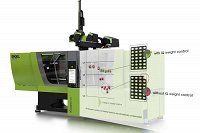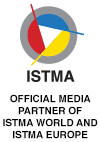ENGEL at Plastics & Rubber Indonesia 2018
10.10.2018
Experience the smart factory – that is ENGEL’s motto going into the 2018 Plastics & Rubber exhibition from November 14th to 17th in Jakarta, Indonesia. In manufacturing lids and handles for food containers, the Austria-based injection moulding machine manufacturer and system solutions provider will demonstrate the opportunities that digitalisation and networking present. In addition, it will show how these, in combination with intelligent machinery, can be applied to maximum effect to unlock the potential for efficiency.
 Self-optimising injection moulding machine
Self-optimising injection moulding machine
inject 4.0 is ENGEL’s answer to the challenges of the fourth industrial revolution. The goal is to achieve a smart factory in which manufacturing processes continuously self-optimise, and processors can respond in a highly flexible way to constantly changing requirements, thanks to production system connectivity and integration, systematic utilisation of machine, process and production data, and the use of intelligent assistance systems. The result is substantially greater productivity, efficiency and quality. ENGEL is demonstrating how these positive outcomes can manifest themselves in the real world by manufacturing lids and handles for food containers on an ENGEL e-victory 310/120 in a 1+1-cavity mould. The tie-bar-less injection moulding machine, featuring an electric injection unit, operates with intelligent assistance. It is equipped with systems including iQ weight control, which analyses the pressure profile during the injection process and compares measured values by means of a reference cycle. For every individual shot, the injection profile, switchover point and holding pressure profile are automatically adapted to current conditions. This balances out fluctuations in the ambient conditions and raw material, as well as keeping the injected melt volume consistent throughout the production operation – enabling the system to reliably prevent rejects.
Boosting the availability of machines
Intelligent assistance is a characteristic of smart machine, one of the three key areas of the smart factory. ENGEL also offers numerous mature products and solutions for smart service and smart production in the scope of its inject 4.0 range, offering immediate and substantial benefits, both stand-alone and in the framework of a higher-level digitalisation strategy.
In order to boost the availability of machines and production cells, smart service relies on online support, remote maintenance and predictive, condition-based maintenance. ENGEL’s e-connect.monitor makes it possible to analyse the status of process-critical machine components during operation and reliably forecast the remaining service life. This way, the service life of critical machine components can be fully utilised without risking unplanned system downtime. e-connect.monitor is available for plasticising screws, ball screws in high-performance electric machines, fixed displacement pumps in servohydraulic injection moulding machines and for hydraulic oil.
The smart production area focuses on networking between the various machines, systems and devices, using authentig, a product by ENGEL subsidiary TIG. The MES ensures transparency throughout the machinery, making it easier to efficiently plan the resources available.
The modular approach of ENGEL’s inject 4.0 range makes the initial steps towards digitalisation and networking particularly easy for processors.
Tie-bar-less technology keeping production cells compact
The design of the tie-bar-less e victory injection moulding machine, which will be on display at Plastics & Rubber Indonesia, also meets strict efficiency and precision requirements. Free access to the mould area considerably accelerates installing and removing moulds, significantly improving the injection moulding machine’s availability, also for smaller batch sizes. On top of this, the tie-bar-less technology allows for particularly compact production cells. Given that mould mounting platens can be used to the hilt, relatively small machines can be fitted with large moulds. This proves to be a plus-point in terms of efficiency, particularly when using multi-cavity moulds or producing three-dimensionally complex components. The moulds are large in both cases, but the clamping force required for precise moulding of the fairly small component surfaces is relatively low. Where a tie-bar-less injection moulding machine is deployed, therefore, the machine size is determined not by mould volume, but by the clamping force required for the moulding process. Thanks to tie-bar-less technology, much smaller injection moulding machines can be used for many applications, which reduces investment and operating costs.
The patented force divider in the tie-bar-less clamping unit enables the moving mould mounting platen to follow the mould exactly parallel while clamping force is building up and ensures that the applied force is evenly distributed across the whole surface. This means both outer and inner cavities are kept closed with precisely identical force, which leads to extremely consistent wall thicknesses and guarantees reproducible high quality.
ENGEL at Plastics & Rubber 2018: hall B3, stand B-5419













































